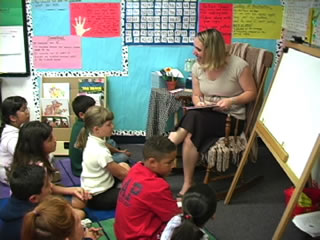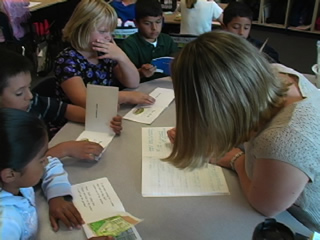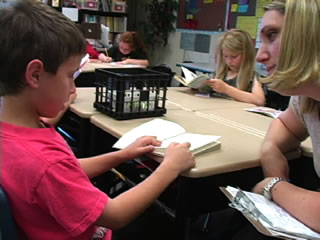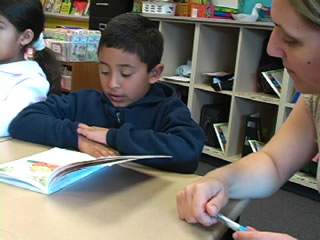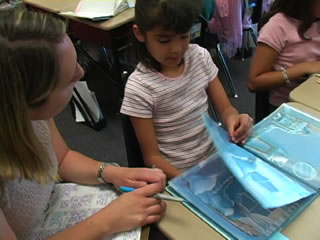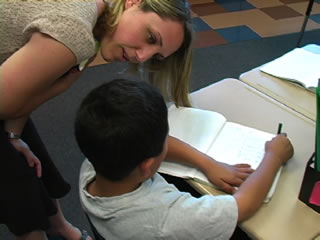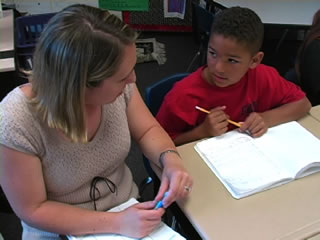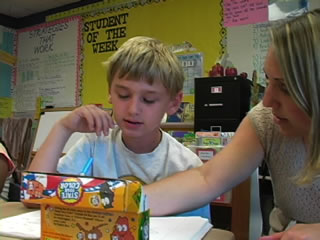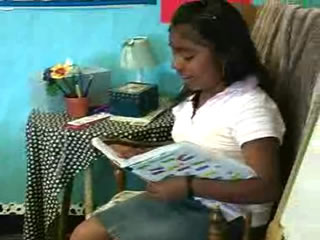Readers and Writers Workshop
This page will give you an indepth look at a morning in my classroom,
including our Readers Workshop, Writers Workshop,
Authors' Chair, and Word Study.
Readers Workshop
Opening Routine and Read Out Loud
That day, I was reading Strega Nona. This was
taped at the end of the year, so I was doing “The
best of readers workshop” for the last two weeks of the
school year-- we were hitting all of the things that I had
already taught throughout the year. Here,
we were talking about text-to-text
connections, which is a comprehension
tool. I modeled for them with my read-out-loud
how to do a text-to-text connection, and then I told them, when
you go back and do your independent reading today, if you have
a text-to-text connection, I want you to take a sticky note,
note the page, and continue reading.
|
Readaloud |
|
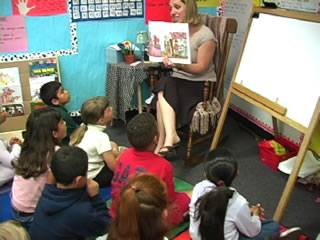 |
| Myers
reads "Strega Nona" (Tomie de Paola) and
alerts students to be looking for text-to-text connections. |
play
|
Quicktime
Player
high • low
get
plugin |
Windows
Media
high • low
get
plugin |
|
Text-to-Text
Connections |
|
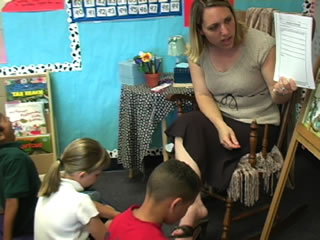 |
| Myers introduces
the worksheet students will use to note the text-to-text
connections they find during independent reading
time. |
play
|
Quicktime
Player
high • low
get
plugin |
Windows
Media
high • low
get
plugin |
|
During Readers Workshop time, the students are doing independent
reading, and I’m
having one-on-one conferences; that’s when I’m
teaching them strategies. I’ll always
tell them something positive that we did… like “Today
I’m noticing that you’re really doing a good job
sounding out words that you’re struggling with, but maybe
what I would like you to do is, do you think you can look at
the pictures for clues if you get stuck.” These strategies
have already been modeled for them in my minilessons in readers
workshop, that would be an example of a mini-lesson that I would
do in the rituals and routines (and you can see our walls for
the different readers workshop lessons we've done throughout
the year). I also reinforce these lessons in guided reading groups. The
beauty is that with readers workshop, they’re all reading
books that are geared to their reading level. During this time,
I also run my Guided Reading Groups.
Picking a "Just Right Book"
During independent reading time, the students select the books,
however, I stay in the library with them, and if I notice there’s
a student who’s really
reading at a level 12, and they want to get a book that’s
a level 22, I will kind of guide them in the right direction. But
they always make the book choices. Posters like “What
is a Just-Right Book?” stay up all year. That is another
mini-lesson that I do in the rituals and routines. We
talk about how posters are not meant for decoration. They’re
meant to be used. And often when
I’m doing my mini-lessons, I’ll take down the poster
off the wall (view the Reader's Workshop wall), and I’ll tell them, “Remember this
poster? Guess what, we need to review it. So we’re going
to go back.” That day we were doing connections. So
I said, “Remember when we were doing connections back at
the beginning of the year?”
One on One Conferences
While I'm conferencing with students, sometimes
I’ll write on a sticky note, “TP:
(Teaching Point) today I want you to work on....” and they
try it. (here’s
my conference notes, here.) Each
student has a block. I’ll tell them, “You know,
I’ve been noticing that the last couple of times I’ve
conferenced with you, I’ve had to remind you to sound out
your words. Are you practicing that?” It holds
me accountable and them accountable. They really thrive with that. They
really do. One thing about the conferences is that they're
very private and indidivualized. So if a student is struggling,
they’re
not ostracized by the rest of the kids. And everybody is,
even though they’re working on the same strategy, or taking
the mini-lesson and applying it in their independent work
time, that makes them feel good, but it’s at their level.
That’s really key here. So there’s none of
this , “Well, you guys are working on this, and you guys
are working on that.” Everybody’s there together.
And it really helps with the community in my classroom. If I
notice that five kids are really struggling I pull them back
to the guided reading table and we will all work on it together. I
really do a lot of group conferences in math– especially
math. I do like that, but I like the individual one-on-one.
Refocusing on the Task
Then, I stopped them at a certain amount of time and I have
them write for me what their text-to-text connection was. They’re
responsible for what they’re reading. They all work
on it together, so I give them some kind of signal—I
ring the bell or I clap—and I’ll have them, say, “Now
you need to go and write down your connection.” And if
they have more than one connection, that’s great.
Sharing back
At the end we always have 10 minutes to reflect, 10 minute share. This
student, for example, was making a text-to-text connection between
The Napping House and the book Stand Tall. I collect and read
these responses every day. In reading their responses, sometimes
I'll notice that a text-to-text connection isn’t actually
a text-to-text connection. My students' work drives my teaching.
So if I’m noticing that ¾ of my class have completely
missed the boat, we will go back and do more mini-lessons on
it. On
other days, I’ll say, “Does
someone want to share with me how you did today in your independent
reading?” They love it, they love to share. And they can’t
say things like “It was fun.” They have to be very
specific, like, “Today, you told me to go back and re-read
when I struggle with a word.” And I’ll ask them, “How
did that go for you?” And they’ll say, “Well,
it went okay, although I’m not really sure that this is
a just-right book.”
Getting
Started on Text-to-Text Connections |
|
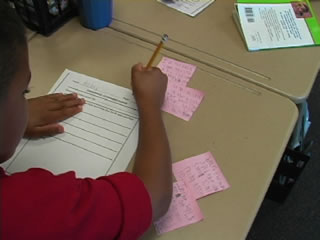 |
| Distributing
the worksheet for students to note text-to-text
connections. |
play
|
Quicktime
Player
high • low
get
plugin |
Windows
Media
high • low
get
plugin |
|
Sharing
Text-to-Text Connections |
|
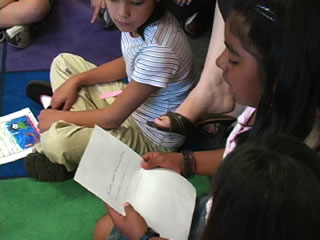 |
| Students share
back the text-to-text connections they found during
independent reading time. |
play
|
Quicktime
Player
high • low
get
plugin |
Windows
Media
high • low
get
plugin |
|
Writers Workshop
Writers'
Workshop Introduction (Mini-Lesson) |
|
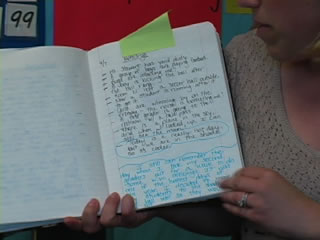 |
| Myers describes turning
previously noted items into a "notebook entry" |
play
|
Quicktime
Player
high • low
get
plugin |
Windows
Media
high • low
get
plugin |
While the kids are doing their independent writing, I
want to be with the kids, one on one. The conversations
that I have with them—they love it, and often I have the
same prompt over time, I sit next to them and I say, “Tell
me what you’re working on today as a writer?” and
they are very specific. But that comes also with the language
that I use with them. I always, I have high expectations
for them, for the kids. So if they say, “I’m writing.” That’s
not acceptable. I say, “You need to tell me what are you
working on right now, specifically.”
|
|
|
Writer's
Conference |
|
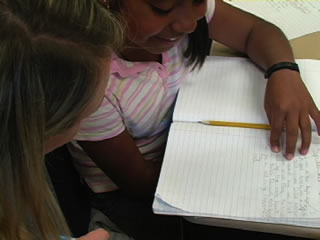 |
| Myers has a writer's
conference during writer's workshop, and asks this
student to share her story in
author's chair. |
play
|
Quicktime
Player
high • low
get
plugin |
Windows
Media
high • low
get
plugin |
|
They might say , “I’m writing a story about the
time I went to Great America.” And I’ll bring
them back, say, “Do you remember today in the mini-lesson
how I wanted you to try a story lead?” and they’ll
say “Yes” and I’ll say, “Let’s
think of a story lead, do you have one?” And they’ll
say, “Oh!” I always give them one thing they did
well, and then their teaching point. Before I leave them,
I always say, “Before I leave you today, tell me what you’re
going to work on as a writer.” They reinforce it, they
say it again, and I might even follow up, and say to them, “Is
this your story lead?” And I might ask them to share in
the author’s chair.
Now, in writers workshop, when I’m in a genre study and
I have posters that
go to that genre study, the moment that genre study is over with,
those posters come down, and I hang them on a coat rack. So they
can use them again if they need do, but I don’t want to
confuse them, so when I’m starting
a new genre study, those new posters then go up on the wall. However,
they still have access to them, like this
one, that is the procedural
unit that we were working on. You can tell that that’s
a procedural poster, because it’s teaching someone how
to do something. I would not leave that poster up if I moved
on to a narrative genre study. It would not benefit the
kids.
Word Study and High Stakes Testing
Our staff struggles with how to address the issue of high-stakes
testing without teaching to the test. That’s
when we came up with the word study format with
the white boards, we decided to do, “Okay, on the test
there might be question addressing this particular thing, so
we’d spend
five minutes." Then at the end of the day, we might review
it again, 5 minutes, with the white boards. So we aren't
teaching to the test, but we are taking a little bit of time
out of our day to address the test. We talked about how
the test is going to look. You will have to bubble in your answers.
This is how you bubble in an answer. We
did one day where we said, “When you take the test, it’s
going to be quiet. There can be no talking, there can be no raising
your hands, and I’m sorry, but I can’t help you.” And
we did a practice test one day. And my kids, I felt, have been
super-prepared for the test.
DAILY SCHEDULE FOR WORKSHOP APPROACH
I really make it a point to keep the schedule the same each day in my room for consistency. I find that the kids do very well with the predictable schedule on a regular basis.
8:00-8:15 Readers' Workshop: Short read aloud with a mini lesson
8:15-8:25 Independent Reading/ Teacher Confers with students one on one ( I do not get to all of my students in one day, but will confer with all sometime during the week).
8:25-9:05 Independent Reading with Independent Work/ Teacher meets with three different guided reading groups. One group goes from 8:25-8:40, Second from 8:40-8:55, Third from 8:55-9:05~9:10
9:10-9:15 Share Out with the whole class
9:15-9:35 Recess
9:35-10:00 Word Study (Focus here is on grammar, high frequency words, punctuation, word groups)
10:00-10:15 Writers Workshop Mini Lesson
10:15-10:50 Independent Writing with one on one teacher conferring
10:50-11:00 Share out whole class
11-11:45 Lunch
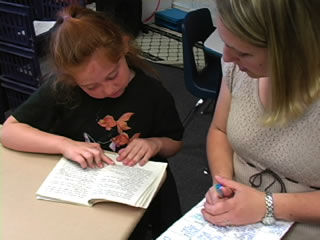 Living
the Life of a Reader and Writer
Living
the Life of a Reader and Writer 